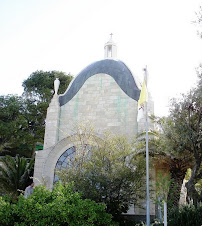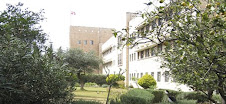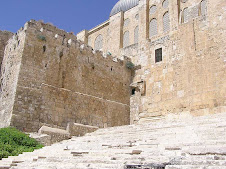After a good journey we arrived at Ben Gurion Airport at 10-20 on Monday evening. A 45 minute coach journey took us up the 2,600 feet to Jerusalem. As we turned into the Tantur Institute we saw a road sign that was so memorable. To the left the city centre; to the right Bet lehem - two words, hebrew letters, the house of bread. Bethlehem!
We had arrived!
It wasn't much before 1-00 before we got to bed and we were up at 7-00 ready for breakfast and an introduction to Tantur.
The inspiration of those who had caught the vision for ecumenism at the Vatican Council, it is a one time Knights of Malta hospital, one time British Prisoner of War camp, one time Roman Catholic Seminary. It is now an Institute where Christians of all denominations come together to study and to experience the Holy Land. On land owned by the Vatican, it is an Institute 'owned' by all denominations bringing Christians together, and bringing Christians together with Jews and Muslims.
We heard of its work behind the scenes in bringing people together from opposing sides of a very tense situation in conversations for peace. Michael McGarry, the current Rector of Tantur shared his vision for that work of peace-making and the excitement of all that Tantur does. Michael Roberts, one time Principal of Westcott house, a theological college in Cambridge, expressed his hope and the hope of the Tantur trustees that our stay should be very much a Journey of Reconciliation.
Michael McGarry took us on to the roof of the Institute. We looked down over the olive groves to the check point into Bethlehem, and to the wall separating Bethlehem from Jerusalem and over into the town of Bethlehem. It was a deeply moving, and profoundly disturbing moment.
The morning's introduction over, it was good to share with Michael McGarry as he said mass. Though not able to take the elements with those who were Catholics there was a very real sense of oneness in all that we shared together. The reading was from John 3: Jesus' conversation with Nicodemus where he speaks of the wind blowing where it will. Michael McGarry suggested that the church and indeed we as individual Christians are like a sailing boat. The church ... and indeed we as individual Christians really only come into our own when the wind catches our sails.
Our prayer for this week is that the wind catches our sails and inspires us for our return.
A delightful lunch over, we went straight out to a waiting bus where we were joined by Hannah, an Israeli Jew who works for the Council of Christians and Jews in jerusalem, based here at Tantur. She was to be our guide in an orientation tour of Jerusalem.
It took us past new settlements to our first view of Jerusalem in all its splendour. The Temple Mount and the Dome of the Rock lay on the opposite side of the valley. To our right, Bethlehem, its wall streaking as far as the eye can see. At 20 feet high an imposing and disturbing sight. Hannah sees her job as enabling people to see Jerusalem through the eyes of other people. Among those she acts as Guide for are Israeli soldiers. She recalls a conversation two had in which one asked why the wall had not been clad with limestone cladding as so many of the builidngs in Jerusalem had been (a legacy of the years of British mandate rule). The other replied that the wall was only to be a temporary message. Hannah expressed her hope that should be so.
From there we drive round to a remarkable view of the Judaean Wilderness. Jerusalem is a city on a mountain: at 2,600 feet it is a very high city. It's where the rain is caught coming as it predominantly does from the West. Climb to this highest point in the city and you look down at a wilderness, a desert that stretches down and down and down past Jericho towards the Dead Sea.
There in the distance a settlement: should that be linked by a fenced off road to Jerusalem it would effectively cut off the north and south parts of that part of the west bank. Controversy rages.
We came back round past the small Arab settlement that was in Jesus' day Bethany. And then we came over the Mount of Olives, the entrance to the city in Jesus' day and saw the view he would have seen when he arrived in the city and wept over it. 'Would that you had seen the things that make for peace,' he said then. We could echo those words today too.
There we could see the Kidron valley and the wall of the city, the Golden Gate through which he may well have come, and the temple mount - the platform built by Herod in the rebuilding of the second temple, and at its centre the Dome of the Rock. To the left the Al Aqba mosque.
Down to the right the Garden of Gethsemane and there beyond the further city wall, the church of the holy sepulcrhe. Was that the place Jesus was buried or was it in the garden tomb, further away still. Who knows? But that's not the point. Seeing the city. Being there. Being here, all those familiar stories have a remarkable ring of truth.
On from the Mount of Olives and around the ancient city our itinerary then took us to the modern city of Jerusalem and to the Knesset, the Israeli parliament and seat of government. We were shown the three dimensions of this democratic state: parliament, the legislature, the executive with its finance ministry and the judiciary with the courts.
Hannah pointed out how the courts were on a hill that was higher than the knesset. Parliament may make the law but they are also under the law.
She went on to comment on the way in which Jerusalem is built around four hills. There's the Temple Mount where God's presence was located; over to the right the Mount of Olives where the shekinah departed at the destruction of the temple at the Exile waiting there for three and a half years in the hope of the return of the Israelites. When they did not return that's where the shekinah, the glory of God, ascended to heaven. It was from the Mount of Olives that the Messiah would come. It was from the Mount of Olives that Jesus came. And it was there that he too ascended to his father in heaven. The Mount of Olives, therefore, links heaven and earth.
Then there was the mount where the seat of government was in all its branches. And beyond those buildings another mount. Here was the memorial to the holocaust, cemeteries to fallen soldiers. A reminder of the deep memory and the cause of the creation of the unique state of Israel where Jewishness is the one criterion for citizenship.
Our tour over we returned to Tantur for evening prayers, another lovely meal and then a conversation with Father Tom Skranski. A key player in Vatican II, he had been involved with Tantur since its inception and for a while succeeded a Quaker as Rector of the Institute. He spoke of the call to reconciliation and the supreme importance of reconciliation in the life and ministry of the chruch and of each of us as Christians. What was the first question in teh Bible, he asked. Where are you? God's question to humanity, to each one of us in Genesis 3. What was the second question? He also asked. Where is your brother? God's question to Cain of his brother Abel.
The first question each of us must ask on our journey of faith as we respond to God and seek to Love God. The second question is equally important for each of us as Christians as we see to answer it in a way very different from Cain's dismissive response.
After hearing the story of Brendan Duddy, the pacifist in Northern Ireland who had been instrumental in bringing the Government and the IRA together throughout the period of the troubles when the Government had vowed never to speak to terrorists, to hear Father Tom speaking of the way in which Tantur too seeks to bring people together who would not otherwise speak to one another. In that process of conversation in which people meet face to face and hear the heart beat of the other lies hope for the beginnings of reconciliation.
It was doubly moving to hear his hope against hope sitting where I was. I was facing the windows and looking through them on to the check point into Bethlehem and beyond to the flood lit wall. Would that that soldier is right and that it is temporary. That has to be our hope and prayer.
Tomorow we head off into the old city of Jerusalem on the next stage of our journey of reconciliation.
Tuesday, April 1, 2008
Subscribe to:
Post Comments (Atom)

%2BChurch.jpg)








1 comment:
Amazing first day! Thank you for sharing in such detail - is this a start to another book?!
Post a Comment